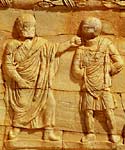Alternatives to rebellion

Those who fought against Rome knew that they could be sent to the slave-market if taken as a prisoner-of-war. They are often said to have killed themselves rather than face the prospect of enslavement - a clear indictment of the horrors involved in the sudden transition from freedom to slavery. Images of the vanquished committing suicide are still visible on the Column of Trajan in Rome.
'... law required a man's slaves to come to his aid if he were attacked, under penalty of death.'
At other times, slaves who were unable to tolerate their conditions assaulted their owners. In the mid-first century AD an anonymous slave murdered his master, a high official in the imperial administration, either because the master had reneged on a promise to set the slave free or because the two were rivals in a sexual intrigue.
The aftermath was disastrous. Roman law required a man's slaves to come to his aid if he were attacked, under penalty of death. The law was enforced against those slaves who had not come to the victim's aid in this case, and all the slaves in the household - allegedly 400 of them - were executed, even though most of them could not possibly have known anything about the murder.
There were other ways to alleviate the burdens of slavery. One was to try to escape, either to return to an original homeland or simply to find safe refuge somewhere. Romans labelled runaway slaves 'fugitives', and as the greatest modern historian of ancient slavery, Moses Finley, has remarked, 'fugitive slaves are almost an obsession in the sources'. This suggests that the incidence of running away was always high.
To deal with the problem, the Romans hired professional slave-catchers to hunt down runaways, and posted advertisements in public places giving precise descriptions of fugitives and offering rewards for their capture. Around the necks of slaves who were recovered they also attached iron collars, giving instructions on what to do with the slaves who wore them if they happened to escape again. Examples can still be seen in museums.
There is no way of knowing how many Roman slaves successfully escaped slavery by running away. But it was possible. And it helped that skin colour was no impediment.
The great orator Cicero can be heard grumbling in his correspondence about a slave named Dionysius, who was well-educated enough to have supervised Cicero's personal library and who must have been relatively well-treated. He ran away anyway. Cicero used all his considerable influence to find the man, but to no avail: Dionysius slipped away across the Adriatic and is last heard of well out of Cicero's reach - somewhere in the Balkans.
Published: 2003-08-19



Bookmark with:
What are these?